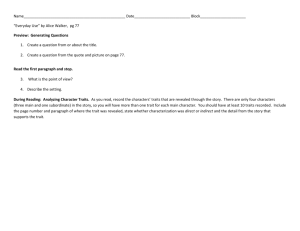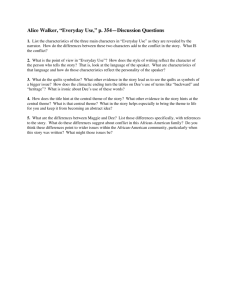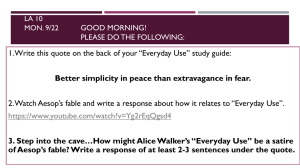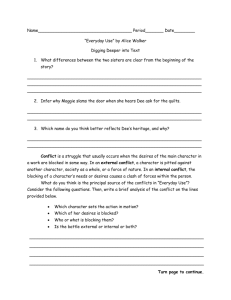Everyday Use
advertisement
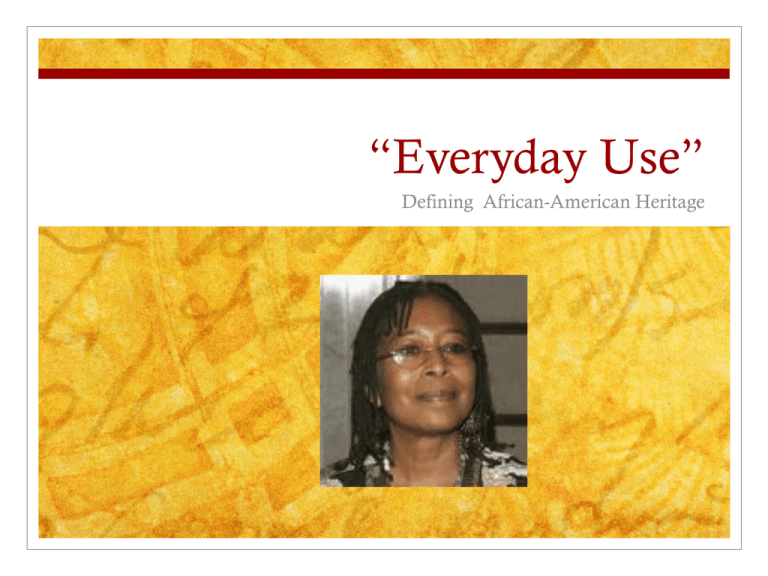
“Everyday Use” Defining African-American Heritage Plot Summary In “Everyday Use,” Alice Walker tells a story of a mother’s conflicted relationship with her two daughters, Dee and Maggie. On its surface, “Everyday Use” tells how a mother gradually rejects the younger, more fortunate daughter. On a deeper level, Alice Walker is exploring the concept of heritage as it applies to AfricanAmericans. Setting “Everyday Use” is set in the late ‘60s or early ‘70s. This was a time when African-Americans were struggling to define their personal identities in cultural terms. The term “Negro” had been replaced with “Black.” There was “Black Power,” “Black Nationalism,” and “Black Pride.” In “Everyday Use,” Alice Walker argues that an African-American is both African and American, and to deny the American side of one’s heritage is disrespectful of and harmful to one’s self. Point of View Mama narrates the story. Mama describes herself as “a large, big-boned woman with rough, man-working hands.” This description along with her reference to a 2nd grade education, leads the reader to conclude that this woman takes pride in the practical aspects of who she is and has not spent a lot of time contemplating heritage. However, her lack of education and refinement does not prevent her from having an inherent understanding of heritage based on her love and respect for those who came before her. This is clear from her ability to associate pieces of fabric in two quilts with the people whose clothes they had been cut from. Symbolism The quilts have a special meaning to Mama. When she moves up to touch the quilts, she is reaching out to touch the people whom the quilts represent. Quilts are referred to in many of Walker’s works. In The Color Purple, she uses a quilt to help a dying woman remember the mother of her adopted daughter. In her essay “In Search of Our Mother’s Gardens,” she writes about a quilt in the Smithsonian Institute that was made by an anonymous black woman. Walker uses quilts to symbolize a bond between women. In “Everyday Use” the bond is between women of several generations. Symbolism (cont.) Walker also uses the butter churn to show Mama’s connection with her family. When Mama takes the dasher handle in her hands, she is symbolically touching the hands of all those who used it before her. Her appreciation for the dasher and quilts is based on love for people who made and used them. Dee (Wangero) Mama’s daughter Dee (Wangero) has a much more superficial idea of heritage. She is portrayed as bright, beautiful, and self-centered. Walker uses Dee to symbolize the Black Power Movement. With Dee, Walker is not condemning the Black Power Movement as a whole. Rather, she is challenging that part of the movement that does not acknowledge and properly respect the many AfricanAmericans who endure incredible hardships in their efforts to survive in a hostile environment. She uses the character of Dee to demonstrate this misguided black pride. Dee (cont.) Dee believes that her new name, her costume, and her boyfriend show her black pride. The story shows her ignorance of her adopted African heritage and her ignorance of her American heritage. She is unaware of how far back the name Dee went in her family. She is also unaware that the quilt was actually made by her Grandma Dee, Big Dee, and Mama. Dee’s lack of knowledge concerning her family is symbolic of the Black Power Movement’s disregard for its American heritage. Maggie Maggie represents the neglected American heritage. Maggie’s scars are symbolic of the scars that all African-Americans carry as a result of the “fire” of slavery. Maggie depiction is reminiscent of the years following the Civil War. She represents the years before the Black Pride Movement when blacks were silent and did not speak out against injustice. Maggie, however, is very aware of her heritage. This is shown by her knowledge of the origins of the dasher. Conflict The conflict between the two daughters over who should rightfully own the quilts and how they should be used is central to the theme of the the story. Walker’s main purpose in this story seems to be to challenge the Black Power Movement, and black people in general, to acknowledge and respect their American heritage. Theme After reading the story, “Everyday Use,” and understanding the historical context and background, what is the theme? Develop a theme statement for the story. Use supporting details from the text to support your writing. Write one full page.

